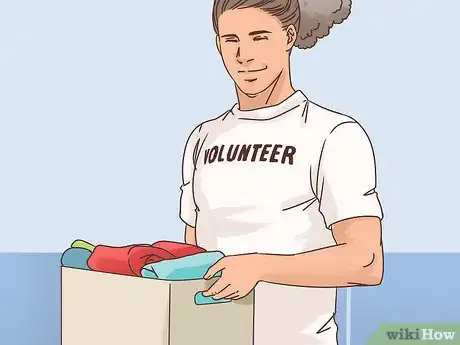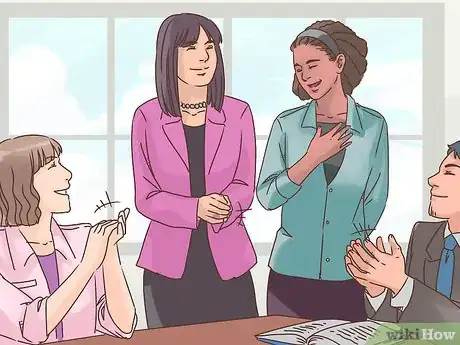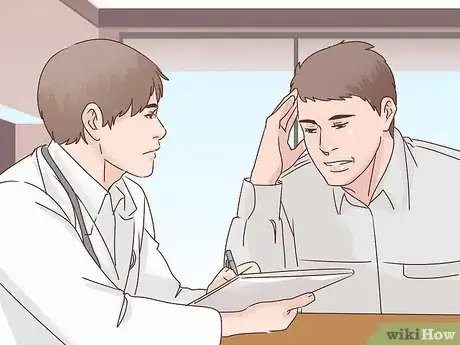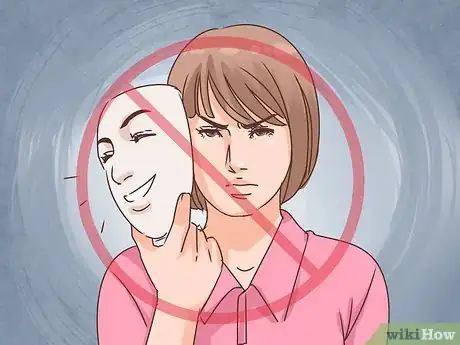This article was co-authored by Erin Conlon, PCC, JD. Erin Conlon is an Executive Life Coach, the Founder of Erin Conlon Coaching, and the host of the podcast "This is Not Advice." She specializes in aiding leaders and executives to thrive in their career and personal lives. In addition to her private coaching practice, she teaches and trains coaches and develops and revises training materials to be more diverse, equitable, and inclusive. She holds a BA in Communications and History and a JD from The University of Michigan. Erin is a Professional Certified Coach with The International Coaching Federation.
There are 8 references cited in this article, which can be found at the bottom of the page.
wikiHow marks an article as reader-approved once it receives enough positive feedback. In this case, 89% of readers who voted found the article helpful, earning it our reader-approved status.
This article has been viewed 231,764 times.
Damaged reputations may not be easy to recover or repair. This is why it's so important to protect your reputation. Sometimes, the loss to your reputation is no fault of yours and sometimes it's your own mistake. Getting your good name back is not always easy – but it can be done with patience, determination, and perseverance.
Steps
Getting Rid of a Bad Reputation
-
1Accept that people might not forget. They may care less with time, but still remember. This doesn't mean fixing your reputation is impossible. Bad reputations are always potentially temporary. It all has to do with time. After some time, people stop caring so much about what you did in the past.
- Many people encounter their own failures and the failures of others over time. These stand out more, and they forget about you. Remember that you remember your own failures better than other people. Your bad reputation may be worse in your head than it is in the eyes of others.
- Research shows that, contrary to popular perception, when compared to other means of social evaluation, reputation matters measurably less than other factors.[1]
- Go off the grid and take a break from social media and online.[2]
- Remember, focus on the things you can control, not the things you can't—you may be able to help change how some people think about you, and not others.[3]
-
2Talk to people about it. Be frank when addressing the issues surrounding your bad reputation. If you are calm, respectful, and genuinely concerned, they are likely to help you. By not verbally addressing the problem, you let people's imaginations run wild, and you give rumors free-range. [4]
- If someone is actively spreading news of your bad reputation, talk to them first.
- Ask friends their opinion on the matter.
- Try not to be defensive.
Advertisement -
3Turn it into a strength. Maybe your bad reputation is a superpower in disguise. Take some time to think about how your bad reputation may be a positive thing and reframe your perception of the situation. You might not be promiscuous, you could be in charge of your sexuality. If people think you play a sport too aggressively, maybe you're your team's heavy artillery.
- Focusing on something negative can make it harder to overcome. Instead, try to find something positive you can do each day to turn your weakness into a strength. For instance, instead of focusing on how you need to be more motivated, make a specific plan for how you're going to tackle something important the next day.[5]
-
4Change how others think. Sometimes you just need to control the perceptions of others. They may not be seeing the situation in the right light. If you can, help others to see the situation in an entirely different light.
- Provide a calculated positive perspective. This means finding ways to reframe events and actions that give you a bad reputation. For example, sometimes people shame promiscuous behavior, while others present promiscuity as “owning your sexuality” or being “sex positive.” Think of ways you can help people see your actions in a new light.
- Be aware that you may not be able to sway everyone's opinions.
-
5Denounce accusations as lies. You may just need to say the reputation is not true. If you have been lied about, it may take some time to undo the damage. Be assertive[6] (not aggressive), and make sure you spread the word as soon as possible. Ask other people to help set the story straight. The longer this bad reputation exists, the harder it may become to manage it.
- Clarify any misunderstandings.
- Be vocal when challenging lies.
Developing a Good Reputation
-
1Do good deeds consistently. A quick way to improve your reputation is to do good deeds. Be careful: if you've recently developed a bad reputation, you might seem desperate or like you're overcompensating by doing a bunch of good deeds. This isn't a quick fix. You must do good deeds consistently for your reputation to improve, otherwise you risk seeming insincere. [7] It is hard and time consuming to build a reputation, but quick and easy to ruin it. Consistency is crucial to firmly establishing your reputation.
- Get your co-workers coffee, or offer to pick up a shift if they need time off.
- Offer your friends help, like a ride or a hand before they need to ask.
- Go out of your way to make sure people are feeling okay if you sense there might be something wrong.
-
2Volunteer. There are a great number of ways to volunteer your time. Care for the elderly or disabled, community gardens and events, as well as church-centered opportunities all are great ways to volunteer. Animal shelters are also great opportunities to help. By giving up your time in the service of others, you can do a great deal to improve your reputation.
- If you're still in school, see what sort of opportunities they can help you find. Many public schools and colleges offer different volunteer opportunities for students.
- Some businesses offer volunteering programs that may come with perks. Talk to your supervisor or HR department to see what sort of opportunities they provide.
- Give talks or lectures at a local school, organization, library or civic group on a topic you know and that would be helpful for others.
-
3Use the situation to learn. Become compassionate towards others with bad reputations. By being nice to those who are not thought well of, after having gained insight from your reputation experience, you can develop positive perceptions. Take the opportunity to see the people who have bad reputations around you that may be in need of a friend.
-
4Impress others. Go above and beyond.[8] Do something amazing. Learn to play a musical instrument. Win a scholarship or award. Run a marathon. By doing impressive things, you can improve how people view you. Respect from others can go a long way toward improving your reputation.
Creating Lasting Change
-
1Change parts of your life. External factors, such as friend groups, habits, and workplace can be part and parcel to how your reputation evolves. A toxic environment with toxic people and relationships may be the source of your problems. Take some time to consider whether or not you need to make some changes in the people and places of your life.
- If you have a bad reputation among friends, maybe it is time to spend time with different people. Maybe your friends are encouraging habits that make people think poorly of you.
- At work, toxic employment environments can create unreasonable expectations of people. A work environment which encourages an unhealthy work-life balance can make it seem that a hard working, dedicated individual is lazy. Examine your workplace culture, and think about whether or not a value clash is causing your reputation to suffer. You may want to find a new job.
-
2Change yourself. This can be a very difficult thing to accomplish. But when you see yourself through the eyes of others, and you don't like what you're looking at, make a change. Changing yourself is hard because we develop strong patterns and habits in life. However, by making big changes in your behavior, people will take notice. This will change how they see you, and it may cause others to re-evaluate their perceptions of you as a person.
-
3Avoid superficial changes. Superficial change is not the same as an authentic change. Inauthentic behavior is hard to keep consistent.[11] When you're not being authentic, people notice. Real change is harder than pretending to be different.
- For instance, you can become more genuinely happy by incorporating meditation, breathing exercises, and gratitude journaling into your life.[12]
Expert Q&A
-
QuestionHow can I turn my strengths into weaknesses?
 Dawn Smith-CamachoDawn Smith-Camacho is the Owner of Whole Life Solutions, a business in which Dawn provides professional speaking on effective decision-making and navigating major changes for entrepreneurs and employees. She also supports individual coaching clients by identifying their core values, managing time, prioritizing, and honing in on their ideal path. Her clients include Vistage, UNICEF, the Los Angeles Police Department (LAPD), the Wedding Industry Professionals Association (WIPA), NACE, and Oracle.
Dawn Smith-CamachoDawn Smith-Camacho is the Owner of Whole Life Solutions, a business in which Dawn provides professional speaking on effective decision-making and navigating major changes for entrepreneurs and employees. She also supports individual coaching clients by identifying their core values, managing time, prioritizing, and honing in on their ideal path. Her clients include Vistage, UNICEF, the Los Angeles Police Department (LAPD), the Wedding Industry Professionals Association (WIPA), NACE, and Oracle.
Career & Life Coach First, you need to figure out if they're really weaknesses, or if you've let other people change the way you see yourself. However, if you really do determine that it's something you need to change about yourself, try to build in something new and positive, rather than focusing on what you're lacking. For instance, if you need to be more motivated, you might set a goal that tomorrow, you're going to do 5 minutes of an activity that you don't want to do.
First, you need to figure out if they're really weaknesses, or if you've let other people change the way you see yourself. However, if you really do determine that it's something you need to change about yourself, try to build in something new and positive, rather than focusing on what you're lacking. For instance, if you need to be more motivated, you might set a goal that tomorrow, you're going to do 5 minutes of an activity that you don't want to do.
Warnings
- You can't make some things right. No apology will satisfy certain types of people – instead, they enjoy playing the victim and painting you as a villain. In those cases, it's best to move on.⧼thumbs_response⧽
References
- ↑ https://www.theguardian.com/education/2022/apr/20/degree-grade-matters-more-than-university-reputation-report-finds
- ↑ https://www.psychologytoday.com/blog/the-new-teen-age/201112/surviving-bad-reputation
- ↑ Dawn Smith-Camacho. Career & Life Coach. Expert Interview. 13 May 2020.
- ↑ https://hbr.org/2015/09/you-really-can-change-your-reputation-at-work
- ↑ Dawn Smith-Camacho. Career & Life Coach. Expert Interview. 13 May 2020.
- ↑ https://www.entrepreneur.com/starting-a-business/7-ways-to-recover-after-a-reputation-crisis/323168
- ↑ https://hbr.org/2007/02/reputation-and-its-risks
- ↑ https://hbr.org/2015/09/you-really-can-change-your-reputation-at-work
- ↑ Erin Conlon, PCC, JD. Executive Life Coach. Expert Interview. 31 August 2021.
- ↑ Erin Conlon, PCC, JD. Executive Life Coach. Expert Interview. 31 August 2021.
- ↑ https://www.thecorporategovernanceinstitute.com/insights/guides/how-can-i-get-my-good-reputation-back/
- ↑ Dawn Smith-Camacho. Career & Life Coach. Expert Interview. 13 May 2020.
About This Article
Having a bad reputation from rumors or things you did in the past can be tough, but you can usually repair your reputation by being open about it. When someone asks you about your past, try to be honest with them so they'll know the truth and rumors won't get out of control. If they make a joke or comment about rumors that aren’t true, just calmly correct them. In general, try to be kind and friendly with people, even if they might not have the best opinion of you. That way, they’ll start to come around when they realize you’re a nice person. Be patient though, since it can take time for people to change their minds. In the meantime, just focus on being yourself and spend time with people who care about you. For more social tips from our co-author, including how to impress people, read on!












































































